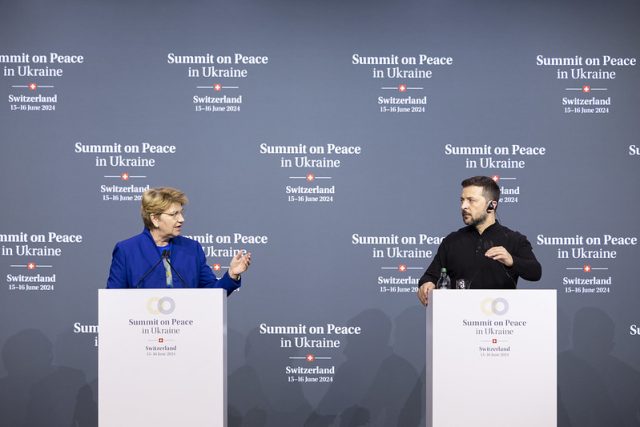
On June 16, Switzerland hosted a high-level peace summit aimed at addressing the conflict in Ukraine. The meeting, held at the Bürgenstock Hotel, brought together representatives from nearly 100 countries and international organizations, most of them allies of Kyiv, with a minority of non-aligned states. Despite Switzerland’s notable effort to promote dialogue, the absence of Russia raises serious doubts about the viability of any peace agreement reached at this forum.
Switzerland, known for its historic neutrality, faces a significant challenge in attempting to mediate this conflict. The adoption of sanctions against Russia has led Moscow to question Bern’s impartiality, labeling it as siding with the “Western minority.” However, Swiss Foreign Minister Ignazio Cassis has defended his country’s stance as “neutral but not indifferent,” emphasizing Switzerland’s willingness to facilitate dialogue at the highest political level.
The Swiss government has identified three main objectives for the summit: providing a platform for dialogue on a comprehensive, just, and lasting peace; promoting a common understanding to achieve this goal; and defining a roadmap to engage both parties in a future peace process. However, Russia’s absence at the summit makes these goals difficult to achieve. Moscow’s refusal to participate has dealt a significant blow to the conference’s aspirations. According to Brian Orend, a Philosophy professor at the University of Waterloo, the summit is more of an international effort to support Ukraine rather than a true peace negotiation. This reflects the difficulty of bringing Russia to the negotiating table without compromising the fundamental principles upheld by Kyiv and its allies.
Although more than 160 delegations were invited, just over half confirmed their attendance. The absence of Russia and China, two key players on the international stage, is particularly notable. China has repeatedly emphasized the importance of equitable participation of all parties in peace talks. Without Moscow’s presence, Beijing decided not to attend, which Ukraine interpreted as an attempt to boycott the conference. Other countries like Pakistan and Brazil questioned the usefulness of their presence at the summit, while India opted to send only a symbolic representative. Even U.S. President Joe Biden did not attend personally, delegating the task to Vice President Kamala Harris and National Security Advisor Jake Sullivan.
The conflict in Ukraine has reached a stalemate, with both sides unable to make significant advances on the front. Ukraine’s summer counteroffensive has failed to meet its objectives, and Russian attacks in Kharkiv have only strengthened Western support for Kyiv. This deadlock reinforces the perception that neither Russia nor Ukraine is willing to negotiate until a decisive advantage is achieved. Russia’s position, insisting on the recognition of the “new territorial realities” following the annexation of several Ukrainian regions, is unacceptable to Kyiv. Meanwhile, Ukraine demands the total withdrawal of Russian forces from occupied territories, including Crimea, as a non-negotiable condition for any peace agreement.
While the peace summit in Switzerland will not resolve the conflict, the final declaration will serve as a barometer of international opinion on the war in Ukraine. The international community, especially countries from the Global South, will be watching for signs of unity or disunity among Ukraine’s allies. Without Russia’s participation and a clear willingness to engage in dialogue from both sides, the prospect of a lasting peace seems distant.



 Subscribe
Subscribe